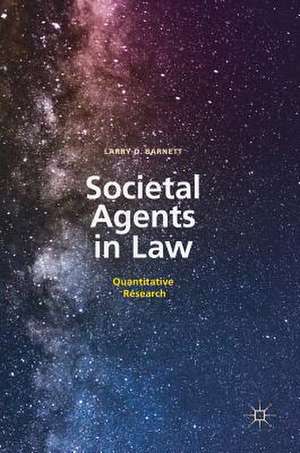Societal Agents in Law: Quantitative Research
Autor Larry D. Barnetten Limba Engleză Hardback – 29 ian 2019
The first volume, Societal Agents in Law: A Macrosociological Approach, puts relevant doctrines of law into a macrosociological framework, uses the findings of quantitative research to formulate theorems that identify the impact of several society-level agents on doctrines of law, and takes the reader through a number of case analyses. The second volume, Societal Agents in Law: Quantitative Research, reports original multivariate statistical studies of sociological determinants of law on specific types of key social activities.
Taken together, the two volumes offer an alternative to the almost-total monopoly of theory and descriptive scholarship in the macrosociology of law, comparative law, and history of law, and underscore the value of a mixed empirical/theoretical approach.
| Toate formatele și edițiile | Preț | Express |
|---|---|---|
| Hardback (2) | 391.79 lei 6-8 săpt. | |
| Springer International Publishing – 29 ian 2019 | 391.79 lei 6-8 săpt. | |
| Springer International Publishing – 10 ian 2019 | 470.72 lei 6-8 săpt. |
Preț: 391.79 lei
Nou
Puncte Express: 588
Preț estimativ în valută:
74.98€ • 77.80$ • 62.67£
74.98€ • 77.80$ • 62.67£
Carte tipărită la comandă
Livrare economică 17-31 martie
Preluare comenzi: 021 569.72.76
Specificații
ISBN-13: 9783030020033
ISBN-10: 3030020037
Pagini: 340
Ilustrații: XVI, 276 p. 6 illus.
Dimensiuni: 148 x 210 mm
Greutate: 0.5 kg
Ediția:1st ed. 2019
Editura: Springer International Publishing
Colecția Palgrave Macmillan
Locul publicării:Cham, Switzerland
ISBN-10: 3030020037
Pagini: 340
Ilustrații: XVI, 276 p. 6 illus.
Dimensiuni: 148 x 210 mm
Greutate: 0.5 kg
Ediția:1st ed. 2019
Editura: Springer International Publishing
Colecția Palgrave Macmillan
Locul publicării:Cham, Switzerland
Cuprins
Chapter 1. Statistical Aspects of Macrosociological Research on Law.- Chapter 2. Jurymen, Jurywomen, and Law.- Chapter 3. “Thou Shall Not Commit Adultery”: The Decriminalization of a Marriage-Endorsing Directive.- Chapter 4. Penal Sanctions and Their Societal Setting: When Law Embraces Death.- Chapter 5. Race, Interstate Migration, and Employment Discrimination Law.- Chapter 6. Religious Freedom Restoration Law.
Notă biografică
Larry D. Barnett is a lawyer (J.D., University of Florida) and a sociologist (Ph.D., Florida State University). His previous books on the macrosociology of law include Explaining Law: Macrosociological Theory and Empirical Evidence (2015); The Place of Law: The Role and Limits of Law in Society (2011); and Legal Construct, Social Concept: A Macrosociological Perspective on Law (1993).
Textul de pe ultima copertă
In this two-volume set, Larry D. Barnett delves into the macrosociological sources of law concerned with society-important social activities in a structurally complex, democratically governed nation. Barnett explores why, when, and where particular proscriptions and prescriptions of law on key social activities arise, persist, and change.
The first volume, Societal Agents in Law: A Macrosociological Approach, puts relevant doctrines of law into a macrosociological framework, uses the findings of quantitative research to formulate theorems that identify the impact of several society-level agents on doctrines of law, and takes the reader through a number of case analyses. The second volume, Societal Agents in Law: Quantitative Research, reports original multivariate statistical studies of sociological determinants of law on specific types of key social activities.
Taken together, the two volumes offer an alternative to the almost-total monopoly oftheory and descriptive scholarship in the macrosociology of law, comparative law, and history of law, and underscore the value of a mixed empirical/theoretical approach.
The first volume, Societal Agents in Law: A Macrosociological Approach, puts relevant doctrines of law into a macrosociological framework, uses the findings of quantitative research to formulate theorems that identify the impact of several society-level agents on doctrines of law, and takes the reader through a number of case analyses. The second volume, Societal Agents in Law: Quantitative Research, reports original multivariate statistical studies of sociological determinants of law on specific types of key social activities.
Taken together, the two volumes offer an alternative to the almost-total monopoly oftheory and descriptive scholarship in the macrosociology of law, comparative law, and history of law, and underscore the value of a mixed empirical/theoretical approach.
Caracteristici
Provides quantitative data to understand the sociological determinants of law on key social activities Allows data to take center stage in discussion of social theory and socio-legal scholarship Offers an alternative to the almost-total monopoly of theory and descriptive scholarship in the macrosociology of law, comparative law, and the history of law
